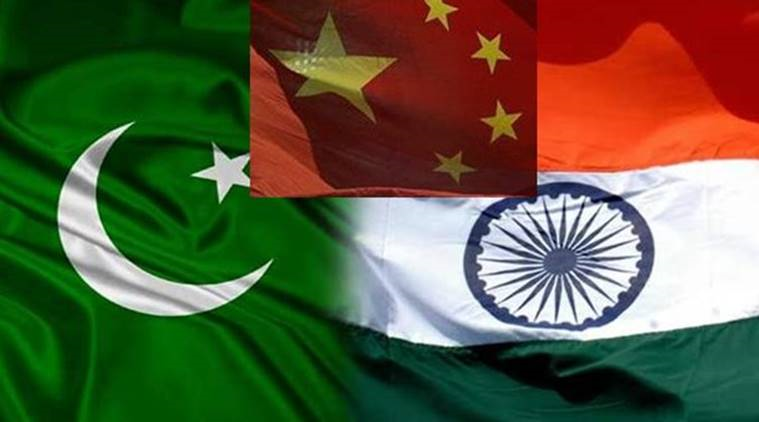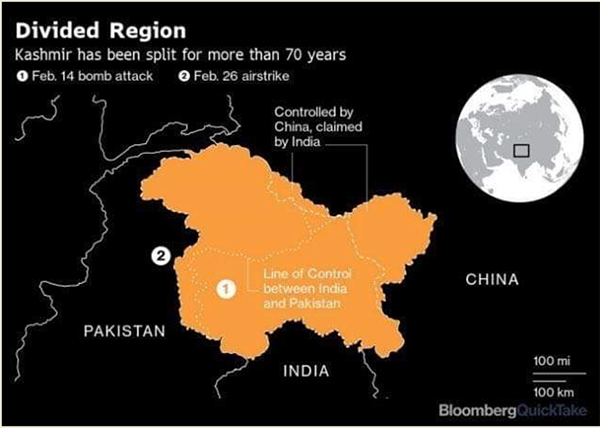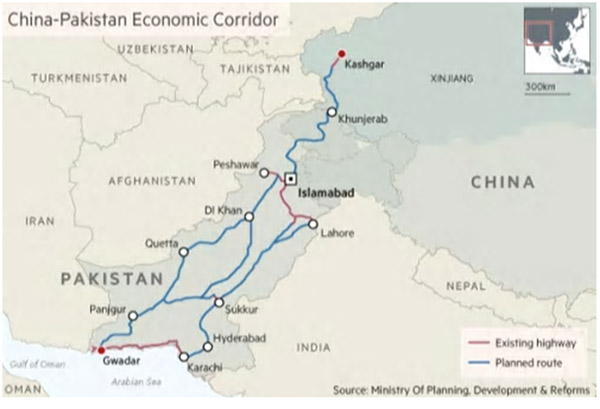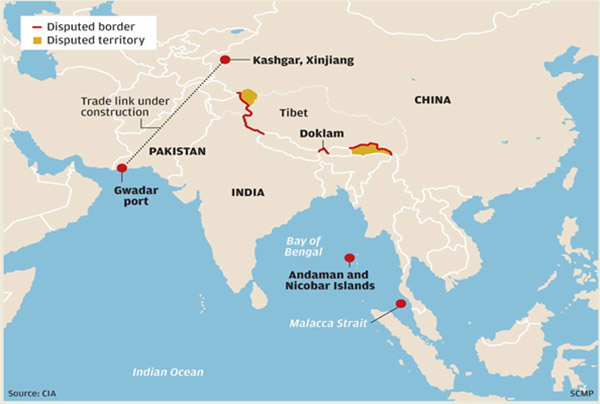
“It’s obvious that the constitutional amendment by India has changed the status quo in Kashmir, causing tensions in the region…. China is deeply concerned about the current situation and opposes any unilateral action that complicates the situation and we call upon the relevant parties to exercise restraint”, said the Chinese Ambassador Zhang Jun as he talked to reporters after the closed-door UNSC meeting. That the Kashmir issue is not an “internal” one for India and China feels threatened by such a move was another message by the Chinese. China will continue to support Pakistan at the international front.
Indeed, the issue pertains to China as much as it does to Pakistan. Let’s have a look at the map of the said region.

We can see that the region of IoK, which is now under tension and unrest, lies very near to the proposed routes of CPEC. An important lesson of geopolitics: never build a project near an unstable region. There is a list of initiatives in Central Asia and other regions of the world, put on halt only due to regional tensions. Take for instance, TAPI - Turkmenistan, Afghanistan, Pakistan and Iran pipeline. While every country involved would reap benefits out of it yet the cost of completion has risen since its inception and the project’s future is still uncertain.
There is another reason for China’s concern: regional stability. Indian expansionism can jeopardise China's regional influence, both political and economic.

It is pertinent to mention here that India is a traditional US ally. The importance of the former for the latter is critical as a counterweight to Chinese ambitions (as perceived) in the region. For China, a reckless India would not only be threatening in terms of security but also economically. Take for instance the coveted Indian Ocean, a maritime highway for world trade. China needs a stable Indian Ocean to make Gwadar work. While India has always been very keen on Chabahar (Iranian port), its ships could clash with that of the Chinese or create a security situation for them at least.

The Siligiru Corridor and Doklam Plateau (see image above) are other key geopolitical issues that keep Chinese leaders concerned about an aggressive India in the region. Both countries have fought a war due to the said issue in 1962, which ended in India's defeat. Both countries in 2017 engaged in heated rhetoric and some military buildup in once again underlining the significance of the region. India’sstrong hold in the Tibetan region in general and Doklam Plateau in particular is worrisome for China.
Yasir Masood, Director for CPEC Centre for Excellence, a research think tank in Islamabad and a geo-strategic analyst, says that “China has stood with Pakistan in the testing times after the unconstitutional scrapping of India’s article 370 according to the NSC arrangements made for Indian Occupied Kashmir, Ladakh and Pakistani side of Kashmir. The worst part is that the terrorist, fascist, fundamentalist BJP has ripped apart the UNSC resolution and also abrogated the Indian constitution."
"China has stakes in Ladakh. Now both China and Pakistan can normalize the situation by proactive lobbying internationally. Organic and creative tactical moves are needed in order to pressurize India to an extent that it agrees on coming to the table. Both China and Pakistan need to do something different, something more than routine diplomatic chores. The region needs more stability, security and peace. India’s hostility is to impede China’s rise and China needs to realize this - the sooner the better.”
Of course the time-tested axiom of there being no friends in international relations holds true in this case as well. However, when interests combine, as they certainly do in this case, countries act together. We should be glad that China, with its growing diplomatic influence, strong economic connections and a threat to its own regional, economic and political stability, has our back.
I opine - and indeed I can be wrong, but let’s hope that I am not - India will lose the battle at the diplomatic front. If Russia mobilizes its diplomatic apparatus like China and if other stakeholders such as Central Asian countries can join the movement, the message could be extremely clear: end Indian hostilities in Kashmir. But with the global economy so profoundly integrated, many countries view India as a marketplace with billions of customers. Let’s hope that these countries set aside their corporate concerns and stand with Pakistan for the Kashmir cause!
Indeed, the issue pertains to China as much as it does to Pakistan. Let’s have a look at the map of the said region.

We can see that the region of IoK, which is now under tension and unrest, lies very near to the proposed routes of CPEC. An important lesson of geopolitics: never build a project near an unstable region. There is a list of initiatives in Central Asia and other regions of the world, put on halt only due to regional tensions. Take for instance, TAPI - Turkmenistan, Afghanistan, Pakistan and Iran pipeline. While every country involved would reap benefits out of it yet the cost of completion has risen since its inception and the project’s future is still uncertain.
There is another reason for China’s concern: regional stability. Indian expansionism can jeopardise China's regional influence, both political and economic.

Image: Financial Times
It is pertinent to mention here that India is a traditional US ally. The importance of the former for the latter is critical as a counterweight to Chinese ambitions (as perceived) in the region. For China, a reckless India would not only be threatening in terms of security but also economically. Take for instance the coveted Indian Ocean, a maritime highway for world trade. China needs a stable Indian Ocean to make Gwadar work. While India has always been very keen on Chabahar (Iranian port), its ships could clash with that of the Chinese or create a security situation for them at least.

Image: South China Morning Post
The Siligiru Corridor and Doklam Plateau (see image above) are other key geopolitical issues that keep Chinese leaders concerned about an aggressive India in the region. Both countries have fought a war due to the said issue in 1962, which ended in India's defeat. Both countries in 2017 engaged in heated rhetoric and some military buildup in once again underlining the significance of the region. India’sstrong hold in the Tibetan region in general and Doklam Plateau in particular is worrisome for China.
Yasir Masood, Director for CPEC Centre for Excellence, a research think tank in Islamabad and a geo-strategic analyst, says that “China has stood with Pakistan in the testing times after the unconstitutional scrapping of India’s article 370 according to the NSC arrangements made for Indian Occupied Kashmir, Ladakh and Pakistani side of Kashmir. The worst part is that the terrorist, fascist, fundamentalist BJP has ripped apart the UNSC resolution and also abrogated the Indian constitution."
"China has stakes in Ladakh. Now both China and Pakistan can normalize the situation by proactive lobbying internationally. Organic and creative tactical moves are needed in order to pressurize India to an extent that it agrees on coming to the table. Both China and Pakistan need to do something different, something more than routine diplomatic chores. The region needs more stability, security and peace. India’s hostility is to impede China’s rise and China needs to realize this - the sooner the better.”
Of course the time-tested axiom of there being no friends in international relations holds true in this case as well. However, when interests combine, as they certainly do in this case, countries act together. We should be glad that China, with its growing diplomatic influence, strong economic connections and a threat to its own regional, economic and political stability, has our back.
I opine - and indeed I can be wrong, but let’s hope that I am not - India will lose the battle at the diplomatic front. If Russia mobilizes its diplomatic apparatus like China and if other stakeholders such as Central Asian countries can join the movement, the message could be extremely clear: end Indian hostilities in Kashmir. But with the global economy so profoundly integrated, many countries view India as a marketplace with billions of customers. Let’s hope that these countries set aside their corporate concerns and stand with Pakistan for the Kashmir cause!
